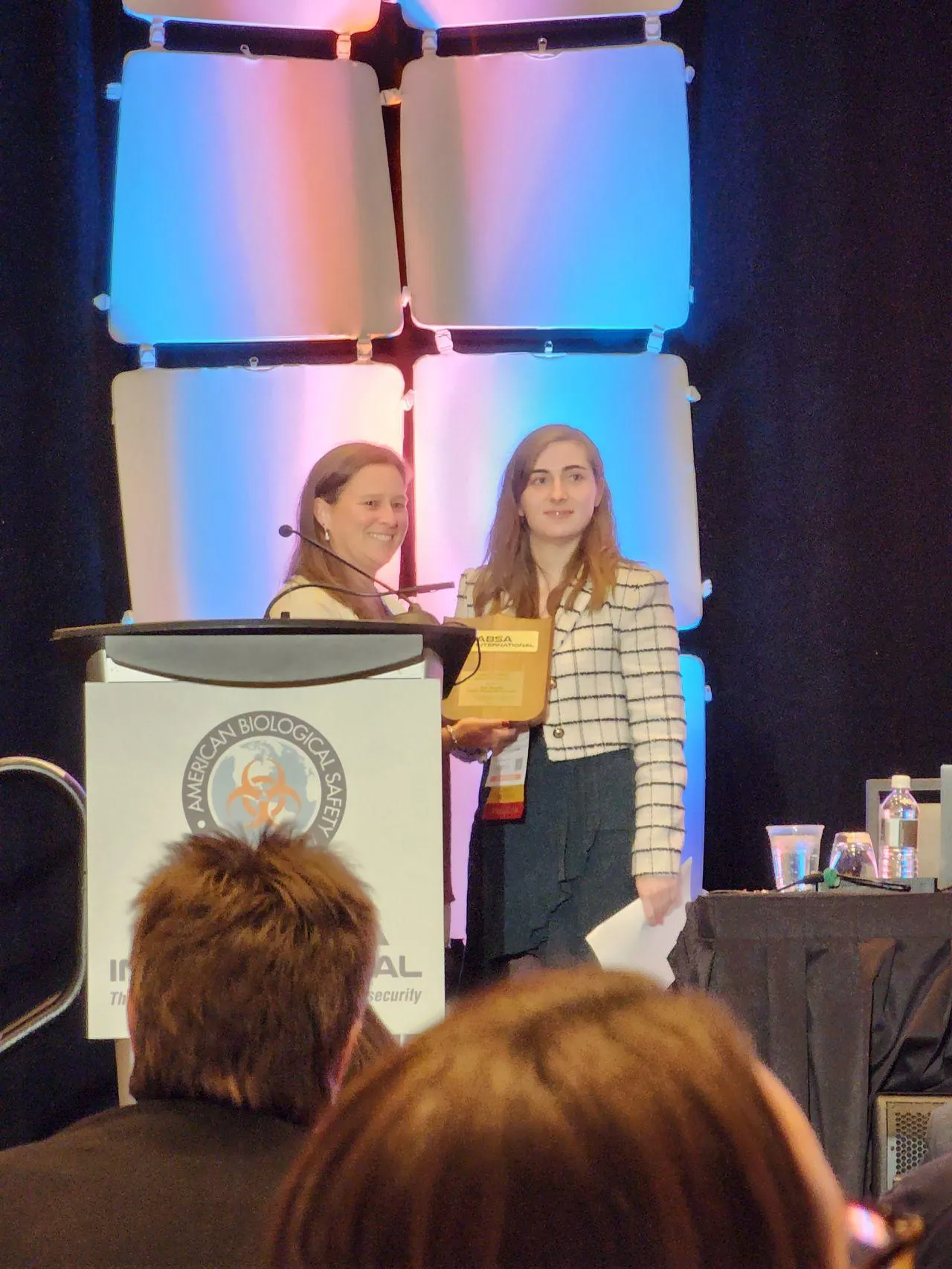12 December 2024
Prestigious award for King's doctoral student
Lara Barbiero Pimentel
Iris Magne, a PhD candidate at King's College London, has been awarded the prestigious Robert I. Gross Memorial Award at the annual Biosafety and Biosecurity Conference organised by the Association for Biosafety and Biosecurity.

Recognised for her significant contributions to the field of biosecurity, Iris reflects on her journey, the importance of her work, and what this honour means to her in this short discussion we had the pleasure to have with her.
Iris is a member of the Russia Institute at King’s and is pursuing an MPhil/PhD in Russian and Eurasian Studies.
How did you get into biosecurity, given that it’s quite different from your PhD?
So, biosecurity, specifically biosecurity education, is about creating a network of scientists who are aware of biosecurity risks and other issues. This means research that could be weaponized by bioterrorists or states using biological weapons. It’s slightly linked to international relations, which I find fascinating because it combines this multidisciplinary approach between life sciences and international relations in biosecurity.
How did you get involved with the project team that presented at the conference?
I was working part-time for London Metropolitan University, where I helped to develop the International Biological Security Education Network (IBSEN). I submitted a project to the ABSA International Conference, the largest conference on biosecurity and biosafety in the world. They had one panel on biosecurity, and I was invited to speak. That’s how I got involved.

What did you speak about at the conference?
I spoke about IBSEN, the Biological Security Education Network, and what we can learn from nuclear and chemical security education to develop biological security education. It was a comparative approach, looking at different types of security education.
How did it feel to get up on stage and receive the award? And how was it presenting in front of that many people? Was it nerve-wracking?
It was a lot of fun and very impressive. The room had nearly 1,000 people; it was the largest audience I’ve ever presented It was also interesting because I was one of the only attendees from Europe. Most were scholars from the US or Latin America. Networking with such a diverse group of people was fascinating.
And yes, it was definitely nerve-wracking! I practiced a lot beforehand to make sure everyone in the room could hear me. The Q&A session was particularly challenging because the audience had such varied backgrounds. The questions were not what I expected, but it was a great learning experience.
Do you have more conferences lined up, and can you tell us more about the one where you received the award?
Unfortunately, I’m finishing my work in biosecurity now. I’ve shifted to working as part of King’s Parliamentary Research Internship. But I still have a few articles lined up in biosecurity, so I’m staying connected to the field. The conference where I received the award was in early November, and I presented on the 6th. I received the award at the end of my presentation. It was held in Phoenix, Arizona, in the US. I was lucky to be there during the elections, which made it an exciting and stressful time.
How would you describe the current state of knowledge in combining international relations and biosecurity?
It’s challenging because a multidisciplinary approach is always difficult, especially when you’re combining such different fields as life sciences and social sciences. A big part of promoting IBSEN has been ensuring that scientists and policymakers recognize the importance of working together. There’s definitely a lack of knowledge and awareness about the necessity of this approach. But initiatives like IBSEN and side events of the Biological and Toxin Weapons Convention are helping bridge this gap.
Did you know you were going to win the award before attending the conference, and how did it feel to walk up and receive it?
Yes, part of the award included covering my flight and stay. I submitted my abstract in May or June and was selected around that time. It is really interesting to see the difference in size of social sciences conferences and life science conferences. I knew it was one of the largest conferences in the field, but I wasn’t aware of just how big it was until I attended. It was amazing to see so many people from the US and Latin America.
Walking up to receive the award was very impressive. I felt so proud because I’d spent eight months working on this network with my team at London Metropolitan University. It was a great way to recognize our work and highlight the urgency of developing biosecurity measures.
And finally, where have you put the award?
It’s on my desk! just sitting there as a motivation for what comes next.

